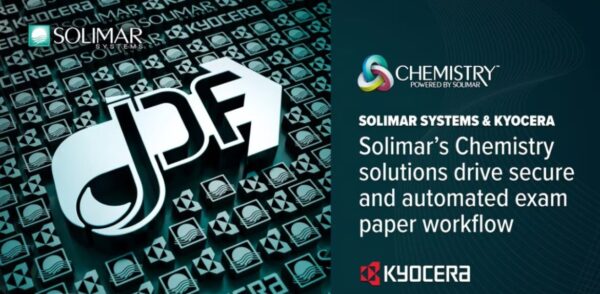MCS finds opportunities for Kyocera’s high-speed inkjet production printer in a vertical primed to replace legacy toner devices.
If a company that manufactures and sells its own high-speed industrial printers sees value in Kyocera Document Solutions America’s first high-speed cut-sheet inkjet production machine as a replacement for legacy toner devices, office technology dealers may want to take a closer look.
MCS, Inc., based in Gaithersburg, Maryland, has been selling a relabeled version of the machine since last December. The company designs, manufactures, sells, and supports industrial inkjet imaging systems, tracking systems, inserting systems, and solutions for the mail manufacturing and marketing industries. In 1989, David Loos founded the company as a reseller of Group 1 mailing software. By 1994, it was manufacturing its own industrial inkjet addressing device, followed by its own high-speed printers in 2004. MCS’s home-grown products are manufactured in Glastonbury, Connecticut.
Approximately 40% of the hardware it sells is its own printing technology, while inserters from BlueCrest represent the other 40%. The remaining 20% comprise miscellaneous products from various manufacturers such as Kyocera. MCS, Inc. has about 50 employees across the country, and yearly revenues of $44 million due in large part to high-speed products with price tags between $200,000 and $1 million. A demo facility is located in its Midwest office in Bolingbrook, Illinois.
Loos has been selling Kyocera printers for 12 years, and when he saw the press release for the TASKalfa Pro 15000c, he was intrigued. Six months later, it was part of his product offerings. As a manufacturer, Loos is selective about which products from other vendors he takes on.
“It’s got to complement our business model and be the right value-add,” he said. “We don’t typically sell commodities. We offer a unique support structure. And we understand the manufacturer’s point of view better than most partners.”
The primary reason for making the Kyocera high-speed cut-sheet production inkjet machine available to MCS’s mailing and marketing customers was declining interest in toner devices. The company made a strategic decision to focus on inkjet about 18 months ago, and today, the hardware it sells is evenly split between inkjet and toner.
“Inkjet is killing the toner market, so this was a defensive move to be relevant,” said Loos. “It’s a great product, and we’re using it to switch customers to inkjet.”
Loos’ customers find inkjet’s low operating and imaging costs appealing. For mailing customers, color image quality is not the reason for the switch to inkjet.
“Obviously, the quality of toner machines is better, but in the mailing market, inkjet is good enough,” acknowledged Loos.
These are still tough customers who require a reliable machine.
“Our customers are high maintenance, high stress,” said Loos. “If they miss a deadline, they can be charged thousands of dollars.”
Most customers operate 24/7 and require 24/7 service. When a device needs service, MCS flies its techs to the customer’s location. Customers typically have other MCS equipment on site which function as backup until a malfunctioning unit is repaired.
The TASKalfa Pro 15000c (MCS relabels it as the Merlin K146C) has been just the ticket for mailing and marketing customers where high-volume output rules. According to Loos, the average mail house does between one and two million pages per month. The TASKalfa Pro 15000c is rated for one million prints per month.
“I guess it can do a lot more than that, but that’s what they’re coming out of the factory telling people,” said Loos.
Since taking on the Kyocera device, MCS has sold six units—all to customers looking to replace a toner device.
As Kyocera builds out its inkjet production line, Loos would be interested in adding more of those devices to his offerings. That, obviously, would be a plus to Kyocera as well.
The value that MCS brings to manufacturers such as Kyocera is its customer relationships along with knowledge about the mailing market and how best to approach it. According to Loos, the partnership with Kyocera has been great so far. Loos appreciates the company’s willingness to listen and not force feed him other Kyocera products. He did make a special request before agreeing to sell the product, asking Kyocera to modify the ink supply.
“It was too small for our customers, and we told them, ‘Our customers would use that in a day.’ And they did it,” said Loos.
MCS has an interesting business model that might pose a challenge for the average office technology dealer to emulate.
“We let people try the equipment for free with no obligation to buy,” explained Loos.
That may not be commonplace with large industrial devices, especially when one considers the cost and effort of installing these devices; however, MCS has a success rate of 95% doing it their way.
“I can’t remember a bad experience doing that over the last 20 years,” said Loos. “We do it with our other equipment too. For a half-a-million-dollar inserter, you have to try it before you buy it.”
It takes about a day to install the Kyocera machine and another day to get it running. MCS also flies customers into the company’s Bolingbrook facility for a week-long training class. When you’re selling top-of-the-line equipment to what Loos described earlier as “high-maintenance, high-stress” customers, it’s essential those folks understand how to use and maintain it.
Asked what it would take for a dealer to be successful selling this device out of the gate, Loos suggests that dealers need to change their mindset about inkjet because the cost-per-page of inkjet is lower than the cost per page of a toner-based device.
“I’m sure the bigger dealers will figure it out,” said Loos. “For me this was attractive over a web press, which doesn’t compete against copiers.”
While Loos doesn’t see inkjet as a big threat in the office space yet, he wouldn’t be surprised if things end up trending in that direction.
“We’ll see,” he said while pointing out that there will be plenty of inkjet machines on the market in the next few years.
Access Related Content
Visit the www.thecannatareport.com. To become a subscriber, visit www.thecannatareport.com/register or contact cjcannata@cannatareport.com directly. Bulk subscription rates are also available.



